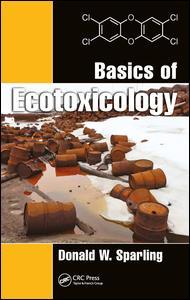Basics of Ecotoxicology
Auteur : Sparling Donald W.

This textbook presents a comprehensive examination of environmental science and ecotoxicology for undergraduate students. The material provides sufficient related background information leading to a competency to clearly understand ecotoxicology concepts and topics.
Introduction To Ecotoxicology. What is Ecotoxicology? Basic Chemistry for Ecotoxicologists. What Are Some Ways That Contaminants Affect Animals and Plants. Major Groups of Contaminants – Where They Come From, What They Can Do. Metals and Metalloids. Currently Used Pesticides. Polycyclic Aromatic Hydrocarbons. Polychlorinated Biphenyls, Polybrominated Compounds, Dioxins and Furans. Mostly Phased Out but Persistent Chlorinated Pesticides. Other Contaminants. Higher Level Effects, Analysis of Risk, And Regulation of Chemicals. Studying the Effects of Contaminants Above the Organism Level. Human Populations and Contaminants. Risk Analysis and Assessment. Domestic and Global Regulation of Environmentally Important Chemicals. Future Perspectives and Concluding Remarks. Index.
Dr. Donald Sparling's career has been a mixture of college level teaching and government service. After receiving his Ph.D. in biology he taught wildlife management courses at Southern Illinois University and biology at Ball State University. In 1982 he started a career in the U.S. Department of the Interior, first as a statistician and then as a research wildlife biologist. There he conducted research on the effects of contaminants on wildlife with publications on acid deposition, munitions, pesticides, metals, polycyclic aromatic hydrocarbons, polychlorinated biphenyls and polybrominated diphenyl ethers. Animal models he and his students have used include amphibians, turtles, mallards, quail, doves, invertebrates and others. He left the government in 2004 to resume teaching various courses including Ecotoxicology and to continue research at Southern Illinois University, Carbondale. Although he retired from that position in 2015 he continues to teach online courses at Holy Apostles College and Seminary and to write books in the ecological sciences. Dr. Sparling has over 100 scientific publications and 6 books to his credit.
Date de parution : 09-2017
15.6x23.4 cm
Thème de Basics of Ecotoxicology :
Mots-clés :
Lethal Concentrations; contaminant effects; Endocrine Disruption; chemical toxicity; Organochlorine Pesticides; polycyclic aromatic hydrocarbons; Haliaeetus Leucocephalus; polychlorinated biphenyls; Northern Bobwhite; environmental chemistry; Toxic Equivalency Quotients; risk analysis; Total PCBs; PAHs; Periodic Chart; Chelydra Serpentina; Total PBDEs; Ecological Receptors; Sea Turtles; Metam Sodium; BP Oil Spill; PFASs; Arbuscular Mycorrhizae; AM; PFOA; PFOS; PBDEs; Stenella Coeruleoalba; HQ; Net Reproductive Rate; Aryl Hydrocarbon Receptor


